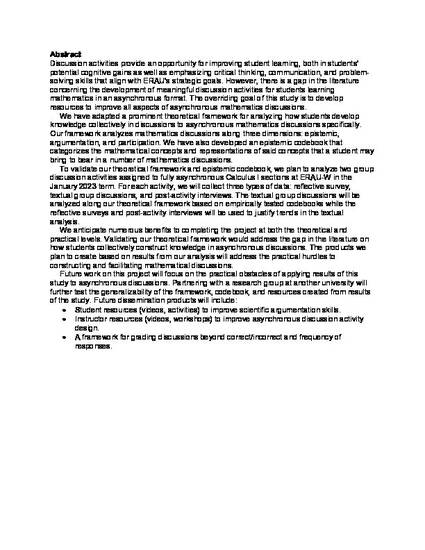
Other
Collective Knowledge Progression and Proliferation in Asynchronous Calculus Discussion Boards
(2023)
Abstract
Discussion activities provide an opportunity for improving student learning, both in students’ potential cognitive gains as well as emphasizing critical thinking, communication, and problem solving skills that align with ERAU’s strategic goals. However, there is a gap in the literature concerning the development of meaningful discussion activities for students learning mathematics in an asynchronous format. The overriding goal of this study is to develop resources to improve all aspects of asynchronous mathematics discussions.
We have adapted a prominent theoretical framework for analyzing how students develop knowledge collectively in discussions to asynchronous mathematics discussions specifically. Our framework analyzes mathematics discussions along three dimensions: epistemic, argumentation, and participation. We have also developed an epistemic codebook that categorizes the mathematical concepts and representations of said concepts that a student may bring to bear in a number of mathematics discussions.
To validate our theoretical framework and epistemic codebook, we plan to analyze two group discussion activities assigned to fully asynchronous Calculus I sections at ERAU-W in the January 2023 term. For each activity, we will collect three types of data: reflective survey, textual group discussions, and post-activity interviews. The textual group discussions will be analyzed along our theoretical framework based on empirically tested codebooks while the reflective surveys and post-activity interviews will be used to justify trends in the textual analysis.
We anticipate numerous benefits to completing the project at both the theoretical and practical levels. Validating our theoretical framework would address the gap in the literature on how students collectively construct knowledge in asynchronous discussions. The products we plan to create based on results from our analysis will address the practical hurdles to constructing and facilitating mathematical discussions.
Future work on this project will focus on the practical obstacles of applying results of this study to asynchronous discussions. Partnering with a research group at another university will further test the generalizability of the framework, codebook, and resources created from results of the study. Future dissemination products will include:
• Student resources (videos, activities) to improve scientific argumentation skills.
• Instructor resources (videos, workshops) to improve asynchronous discussion activity design.
• A framework for grading discussions beyond correct/incorrect and frequency of responses.
Disciplines
Publication Date
2023
Citation Information
Darryl Chamberlain, Zackery Reed and Karen Keene. "Collective Knowledge Progression and Proliferation in Asynchronous Calculus Discussion Boards" (2023) Available at: http://works.bepress.com/darryl-chamberlain/21/
